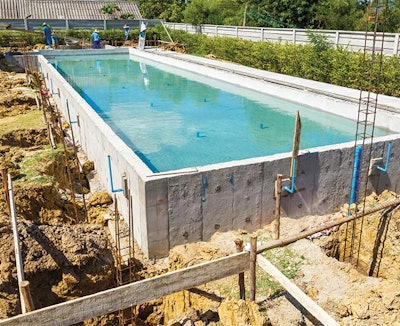
As a builder, it’s better to have a client pay for a pool in cash than to get involved with an arrangement that involves a third party, signed forms and disbursements of funds — that legal compact commonly known as a “loan” — right?
“Actually, no,” says Greg Powell, president of Viking Capital, a Floridabased company that works to match pool buyers with lenders in order to ease the process of funding construction. “There are important advantages to financing a pool for both the builder and the customer, starting with the most obvious: customer preference. Many people, if given the choice, just prefer a payment.
“If they can finance a pool, they don’t have to touch that cash they put so much effort into saving. They can hang on to their cash and automatically transfer $750 or whatever the payment is each month. They’ve got their pool, and they still have the cash there if they want to add a spa or a firepit, and it’s going to cost another $10 thousand. They still have money for that. Through the credit unions that we’re working with, we even try to give them a little extra in the loan, just in case something comes up.”
The psychology of the loan is a powerful sales tool for builders, a proven cognitive process that moves customers toward that comfort zone that results in a yes. As someone who has spent his entire career in finance, Powell is well acquainted with its capacity to convince.
“Before I started Viking Capital, I worked in home improvement loans, and I realized that what many people really think about when they’re deciding whether to purchase a big ticket item is the difference it will make in their monthly finances. If something can work in their monthly budget, then it’s something they can afford.
RELATED: A Better Way to Borrow
“I used to sell those four season sunrooms, and our discussion was usually about the payment — that’s what we were arranging. ‘You can have this one for $299 a month. If you want to make it a little bigger, it will be $328 a month. If you want a heater, it’ll be $340 a month. And the decision of whether to buy an accessory like a heater would come down to, ‘Yeah, I’ll add another $12 a month for a heater.’”
This is the perspective of a large demographic of pool buyers, Powell notes, the concept being well-established in a starter home that required a down payment of 10 or 20%, with the homebuying decision informed by the monthly payment required.
But beyond that demographic, even for consumers that can pay cash for a pool, there’s still an easier psychological path to pool ownership through a loan.
“It’s just a lot easier to pay things down than to save things up. If I have $100 thousand in the bank, and I want a $100 thousand pool, I would much rather leave my $100 thousand in there, borrow the money, and then just work it down until the loan balance is gone — rather than spend my money in the bank and try to re-save it.”
In essence, a customer with $100 thousand in the bank, a $100 thousand loan balance and a new pool feels wealthier than a cash customer with nothing in the bank and a new pool, even though both have the same net worth.
QUALIFYING LEADS
Psychology aside, one of the strongest arguments for pool financing is that the loan process itself benefits both parties — the builder and the buyer — by forcing them to reckon with the customer’s true monetary means early on, saving everyone a lot of time and stress.
This has been enormously helpful in the pandemic surge as builders have been flooded with leads of varying quality — some good, and some not so good. Qualifying these leads has become a new area of expensive effort in many building companies.
A loan application can do that same job quickly and painlessly. An online application for a pool loan requires a customer to submit to a credit analysis, which instantly separates the “coping kickers” from the committed buyers who have the assets to fund a pool project.
RELATED: Cash For Breaking Ground
“That’s what a lot of builders started doing during COVID, because it got so busy,” Powell says. “They’d just email the customer the loan application link five days before the Zoom call or the property visit, and they’d just say to the customer, ‘Look, just fill this thing out. It’s a soft credit pull, no hit to your credit score. There is nothing to lose, no cost, but let’s just see what you’re looking at financially.’
“And you know, sometimes when that customer applies, it turns out they’ve got a 530 FICO score, and then the pool builder has just saved hours of precious time. He never has to drive out to the property or have a long conversation about the plans. The builder can just say to the customer over the phone, ‘Look, if you can show us some way that you can pay for this thing, we’re on our way, but if you can’t, we don’t want to waste anyone’s time.’
“We have a video that builders can send to the customer that walks them through the whole process. Of course, some of those applications are perfect, but some of them aren’t going anywhere. They can’t possibly pay for a pool, and we can tell that within 24 hours.”
The time savings can be significant and can ease a lot of frustration for construction companies, Powell says. “We had a lady one time that received 13 different swimming pool estimates. She gave us a call after each visit, but just talked to us and never applied for a loan. We kept saying, ‘Please apply. Let’s find out.’ Finally, after 13 estimates, she did, and she was like a 500 FICO. And of course, she couldn’t afford a pool, and she never bought one.
“I just wince when I think about how much time was wasted by those 13 builders — all those hours in her kitchen.”
LOSING TO FLORIDA STATE
From qualifying leads online to expanding customers’ views of their economic horizons, the logic of pool loans is hard to deny. At the end of the day, a pool builder that proffers financing options is simply going to sell more pools than one that does not.
RELATED: Financing: Turning Backyard Dreams into Reality
“If you’re not using financing to help close customers, you’re just losing deals. There’s no two ways about it,” Powell says. “A customer calls you; you go out there; you spend however many hours, and then you hand them a bid for $62 thousand. They thought it was going to be $35 or $40 thousand. They don’t tell you, ‘I don’t have that much cash.’ They just tell you, ‘Oh, you know what? My kid just got accepted at Florida State, and we’re going to have to put this thing on hold.’
“So the idea is to get the financing in front of them. Just let them know it’s there. Because with that $35 or $40 thousand and a payment, they can get that pool easier than they think. Let them know it’s very common to finance some of it — or all of it — and there’s no penalty for paying things off early.”
This article first appeared in the August 2021 issue of AQUA Magazine — the top resource for retailers, builders and service pros in the pool and spa industry. Subscriptions to the print magazine are free to all industry professionals. Click here to subscribe.











































